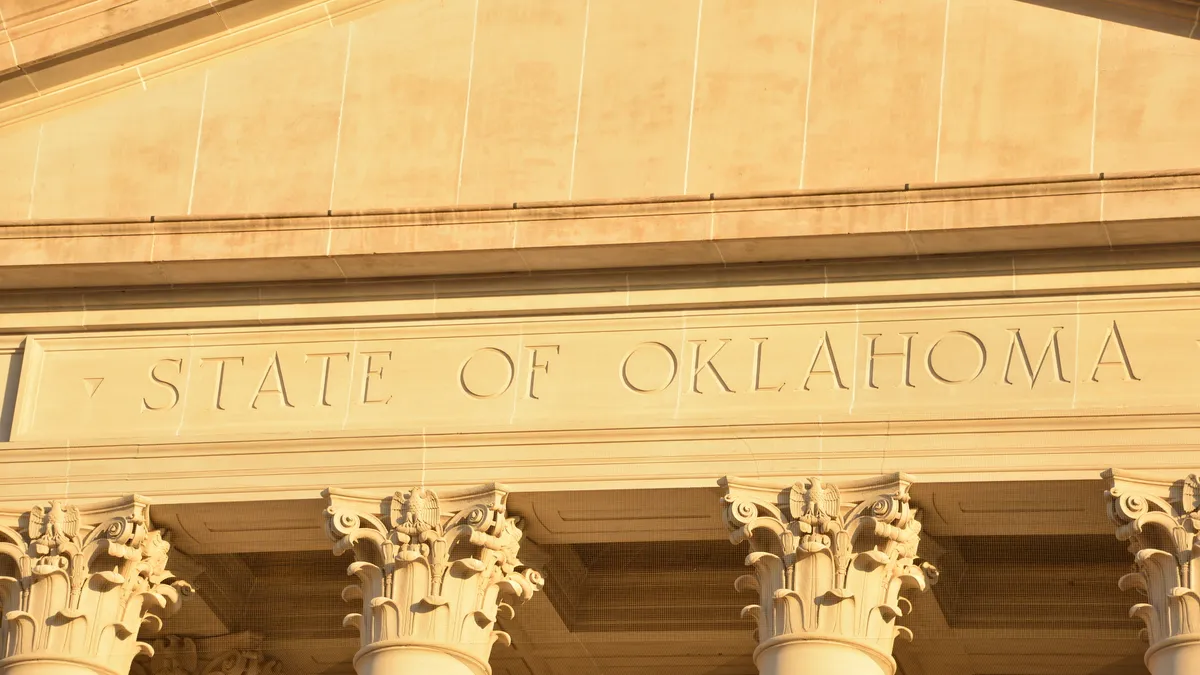Dive Brief:
- A retired state employee filed a lawsuit against Oklahoma and its treasurer, Todd Russ, last week to block the enforcement of a new anti-ESG law that prevents the state from doing business with financial institutions that it believes discriminate against oil and gas companies.
- The plaintiff, Don Keenan, alleges the state’s 2022 Energy Discrimination Elimination Act is “unconstitutional” and violates the First Amendment because it prevents state-managed pension funds from operating for the “exclusive benefit” of their beneficiaries.
- Currently, under this law, financial institutions that qualify for state divestments include BlackRock, JPMorgan Chase, Wells Fargo, Bank of America, State Street and Climate First Bank.
Dive Insight:
According to the lawsuit, Oklahoma’s state law is “unconstitutionally vague” as it provides the state treasurer “a lot of leeway” in determining how financial firms are discriminating against the oil and gas industry.
Keenan argues it would cost the pension system approximately $10 million to divest from BlackRock and State Street, “with the potential for even greater losses,” and more than $1 million to pivot from using Bank of America for an infrastructure bond issue.
“I object to my retirement benefits being depleted because the State of Oklahoma believes that making political statements with retiree dollars is more important than taking care of retirees themselves,” Keenan said in an affidavit accompanying the lawsuit.
Keenan’s lawsuit is part of a bigger coalition effort being carried out to block the enforcement of the Energy Discrimination Elimination Act. The coalition includes Keep Oklahoma's Promises Coalition, Oklahoma Retired Educators Association and the Oklahoma Public Employees Association, which Keenan previously served as state president for.
“The decision to pursue legal action against Todd Russ was not taken lightly, but we feel it is necessary to strengthen the fiduciary responsibility of our pension systems,” OPEA’s executive director, Tony DeSha, said in a press release.
The state’s divestment list was updated in August this year, with Russ shortening his initial selection of excluded financial institutions from 13 to 6. The preliminary divestment list released by his office in May included Lexington Partners, GCM Grosvenor, FirstMark Fund Partners, StepStone VC Global Partners, WCM Investment Management, William Blair and Actis.
The Sooner State is one of several states introducing anti-ESG legislation: At least 25 anti-ESG bills passed in 12 Republican-led states, and 19 states have at least one bill opposing the principle on their books, according to S&P Global Market Intelligence. Florida and Texas, in particular, have cemented their status in leading the anti-ESG crusade, introducing several bills banning the consideration of environmental, social and governance factors in their funds and policies.
Texas recently updated its own anti-ESG divestment list, with the state comptroller adding five new firms last month it said “boycott the oil and gas industry.” A total of 15 companies, including BlackRock, are now banned from doing business with the state.










